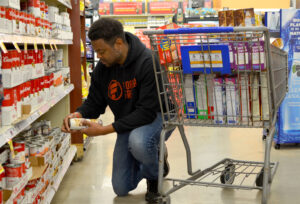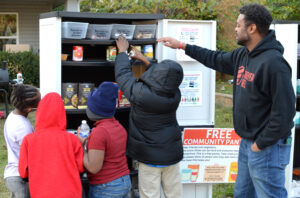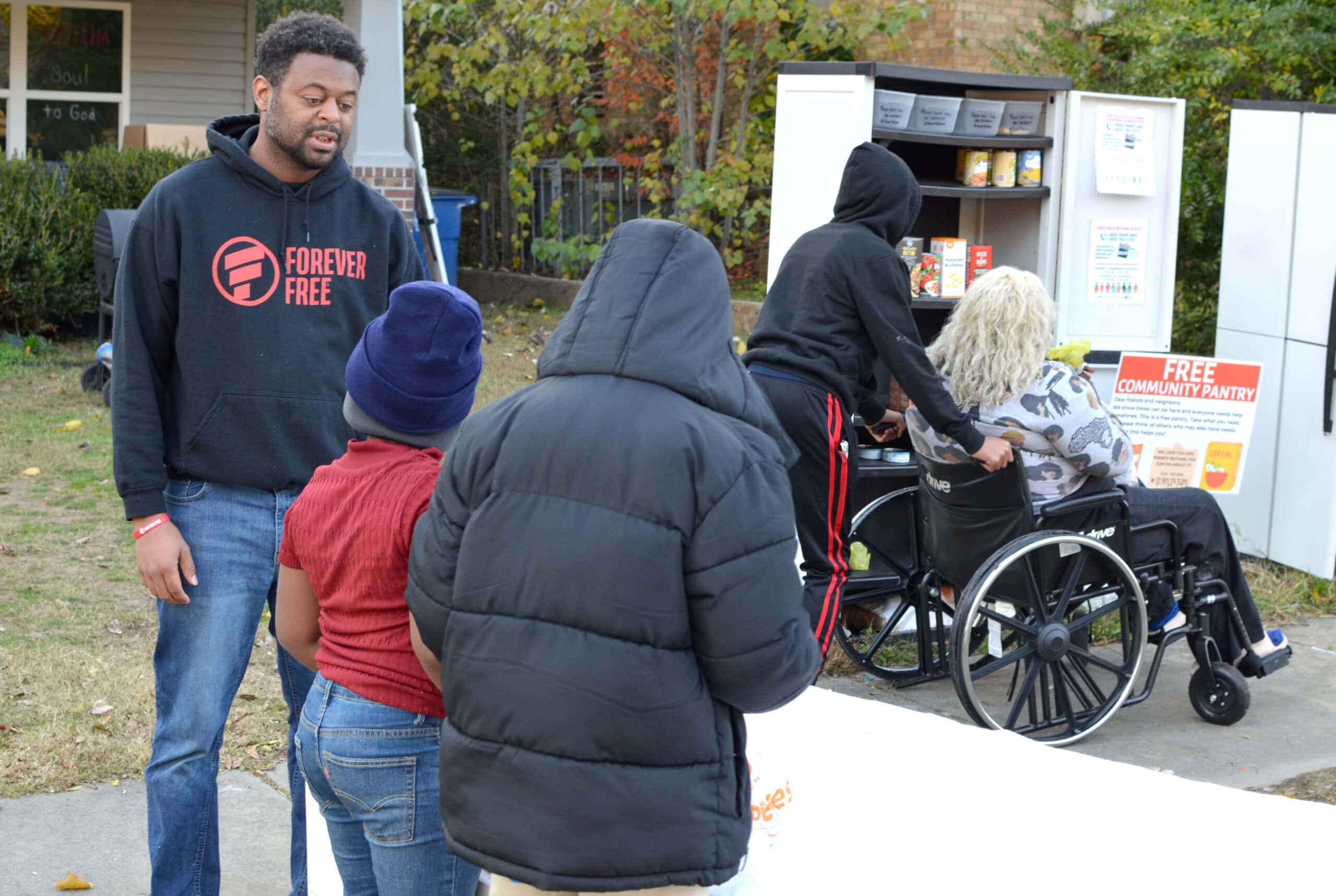UAMS Employee Opens Food Pantry to Feed His Community
| Richard Tatum is adamant about addressing food insecurities in his North Little Rock neighborhood.
A clinical research coordinator for the University of Arkansas for Medical Sciences (UAMS) Fay W. Boozman College of Public Health Center for Research Health and Social Justice, Tatum acknowledges that the status of his community is problematic. “We’re in an area that can be rough,” he said. “We’re in an area that needs hope.
“There are food deserts, and there’s also food swamps. With food swamps, there’s food available — but it’s not healthy. Yet the unhealthy foods become a part of people’s regular meal choices because that’s what’s immediately available. I see a lot of that in my community.”
In June, the Tatum household took matters into their own hands and launched a food pantry.
“I wasn’t sure how we were going to do it,” Tatum admitted. “I just knew we had to do it. There’s always a need, and there’s always a resource — it’s just about connecting the dots.”
A pair of peculiar developments involving neighborhood youth ultimately prompted Tatum to start the pantry.
“At 9:30 at night a kid knocks on the door,” Tatum said. “I didn’t know his name. But I’ve seen him in the neighborhood. I open the door, and he tells me that he’s hungry. I go to our cabinet and grab a box of cereal and hand it to him. He told me thank you and walked away. At that time, there was drug activity and violence in our neighborhood. He risked walking through that kind of environment to ask for food. That put it in my heart that there’s a need, and maybe we’re the people to help.”
He also recalled an instance at a local Dollar General when he saw a group of kids shoplifting.

Richard Tatum, a clinical research coordinator for the University of Arkansas for Medical Sciences Fay W. Boozman College of Public Health Center for Research Health and Social Justice, purchases items for the community food pantry he and his wife conducts out of their front yard.
“I grew up in that kind of culture. Those kids didn’t do that because they’re bored,” he said. “They did it because they’re hungry, and there’s nothing to eat at home. That was the moment when I realized that I must do something to help.”
Tatum publicly announced his intentions via social media when he requested a shed to start a pantry. Shortly after, he received donations of two sheds, food and his first financial donation. The vision had become a reality.
The two large sheds are in Tatum’s front yard. The food is available 24/7. The pantry includes mostly nonperishable food along with a few hygiene products. The Tatum family has rarely used their own money for the pantry. Since June, they’ve received nearly $7,000 in donations. Additionally, numerous food contributions have come from individuals, schools, ministries and nonprofits.
With each ongoing month, the popularity of the pantry grows.
“Our pantry is not a 501(c)(3) organization so our pantry is not eligible for government funding or backing,” Tatum said. “We depend upon the community for help with this mission.”
Tatum said he has no desire to register the pantry as an official nonprofit. But it’s important to him that he maintains full transparency with the public, especially donors. The transparency is to let people know that he’s trustworthy.
“Due to this being driven almost exclusively by the generosity of community members, I don’t want anyone to have to guess or speculate about what we’re doing with their money,” he said.
Tatum is grateful that the pantry is thriving, although it has come with a few hiccups.
“There have been some annoyances that come with this — unfortunately,” Tatum said. “We’ve had people knock on our door at 11 p.m. wanting food. Yes, it’s an inconvenience having to put together something for them to eat. But I’d rather them inconvenience me than to commit a crime and end up in jail, because they were hungry.”
Kids have also taken items out of the pantry and “spread them all over the street,” he said. To solve that problem, he and his wife started stocking snack foods that appeal to kids. It has proven successful.
Tatum and his wife both grew up in environments that were far from ideal, which helps the couple maintain a proper perspective regarding the pantry.
“My wife and I are from broken homes,” he said. “We know what it’s like to be in need. We know what it’s like having to go to people and ask for help. We know what it’s like living that way.

Richard Tatum, a clinical research coordinator for the University of Arkansas for Medical Sciences Fay W. Boozman College of Public Health Center for Research Health and Social Justice, has a community food pantry in the front yard of his home. In this photo, he helps a group of kids get snacks from the pantry.
“I refer to it as the cycle of blessings. If someone has blessed me, I need to pass it on to the next person,” he added. “I can’t build a relationship with a hungry person. But if I meet an immediate need of addressing hunger, then I can share the knowledge I have, the outlook on life that I’ve developed, which I know can help others.”
He said the pantry is a way to combat not only hunger but also crime and despair.
“With the food pantry, we’re battling hopelessness, which is one of the most dangerous emotions,” he said. “My wife and I have experienced what it was like to receive. We’re now in a situation where we’re around people who need to receive. What I’ve overcome in my life, transformed my viewpoint on people. I’m now more compassionate. I see people — and their behaviors — differently now.
“In a community where people are underfed, hungry and needs are not met, crime happens. But what if I took the time to help meet those needs? Now I don’t have to worry about someone selling drugs in the community. I don’t have to worry about someone pulling a gun on me because I’m seeing those needs and providing solutions.”
For the Tatum family, the pantry is about establishing a new community standard. And also being willing to solve an issue, instead of accepting it as the norm.
“Change starts on the smallest of levels and then it radiates,” he said. “This pantry, my wife and I, we do this because we love it.
“Anybody can do it. You just need a heart and a will to do it. You just have to get started.”
